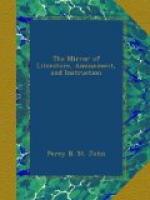From me, the miles by Britons
once were counted,
Close to my side
were monies lent and paid;
If princes died—some
gaudy herald mounted
Upon my head,
and proclamations read;
Till Gresham rose; who used
me very ill,
He moved the place of commerce
to Cornhill.
When reeling homewards from
the tavern near,
Oft with prince
Henry has old honest Jack
Sat on my breast, and I’ve
been doomed to hear
Him talk of valour,
and of unpaid sack;
And whilst he talked, the
roysterers gave vent,
To peals of laughter and of
merriment.
Yes, I’m the hone that
“City’s Lord” essayed,
To make the whetstone
of his rebel sword;
On me, with mischief rife,
rebellious Cade
Sat whilst he
thought and dubbed himself a Lord;
And bade my conduit pipe for
one whole year
At city’s cost, run
naught but claret clear.[3]
I could a tale of harrowing
woes reveal,
Whilst York and
Lancaster for mastery tried:
When men the ties of nature
ceased to feel,
When sires beneath
their offsprings’ sabres died;
And sires ’gainst children
clad themselves in arms,
And England mourned the din
of war’s alarms.
Yes, I beheld the beauteous
virgin queen,
And all the dauntless
heroes of her court;
Where danger threatened, ’midst
the danger seen,
Bending their
fearless way to Tilbury Fort;
I heard the shouts of joy
which Britons gave,
When th’ Armada sank
beneath the wave.
I mind, Augusta,[4] well that
fatal day,
When to thy ports
with dire contagion fraught.
The laden vessel[5] stemmed
its gallant way.
And to thy sons
the plague disastrous brought;
Quick through thy walls the
foul infection spread,
And thou became the city of
the dead.
Scarce ceased the plague—when
to my aching sight
Appeared a scene
of most terrific woe;
Around me burnt one monstrous
blaze of light,
I warmed, and
almost melted with its glow;
I burst the chains,[6] which
bound me fast, asunder,
And now remain, to learned
men a wonder.
And when the city from her
ruins rose,
I soon was left
deserted and forlorn;
A porters’ bench was
raised beneath my nose.
And I became the
object of their scorn:
I’ve heard the rascals,
with a vacant stare,
Ask, just like you, what business
I had there?
Few years have passed, since
I, by parish sages,
Was called a monstrous
nuisance to the street,
And, though I’d borne
the brunt of varying ages,
Was doomed for
pavement ‘neath the horses’ feet,
Until a Maiden,[7] near to
Sherborne Lane,
Saved me—and rescued
London from that stain.
And now, vain mortal, I have told
thee all,
My fate, my primal use, the what and which;
And though my struggling spirit owned thy salt,
Once more I’ll slumber in my holy niche,
And “Britain’s sun may set,”
what’s that to me,
Since I, stone-blind and dumb, for aye will be.




